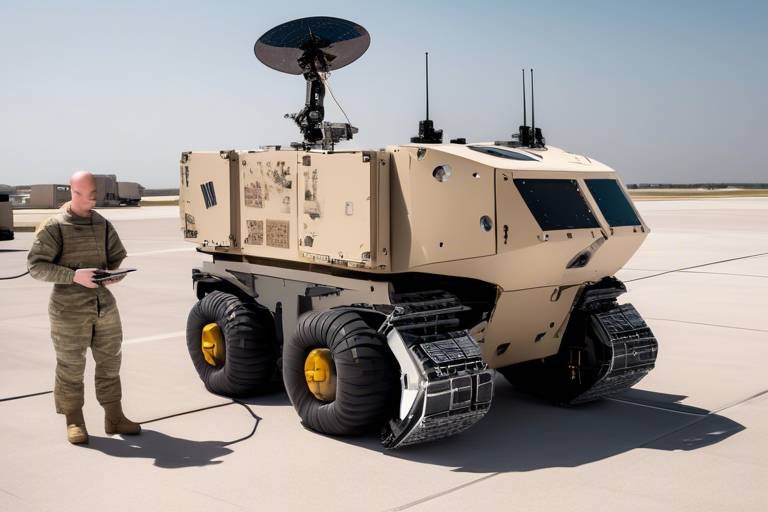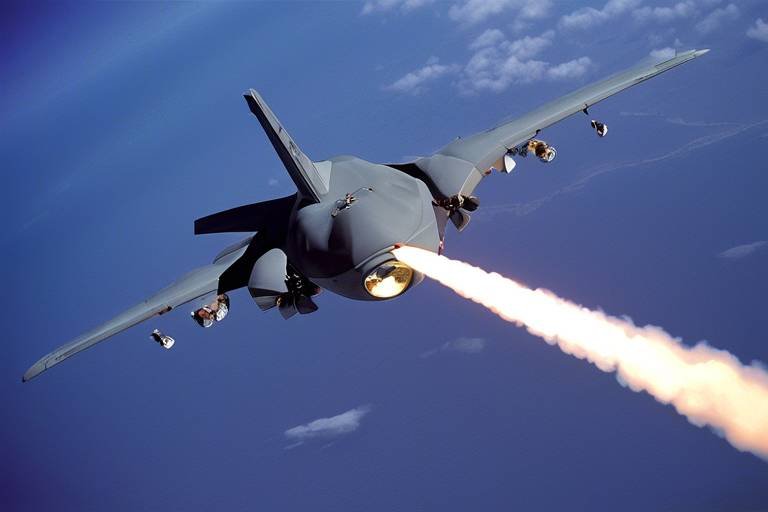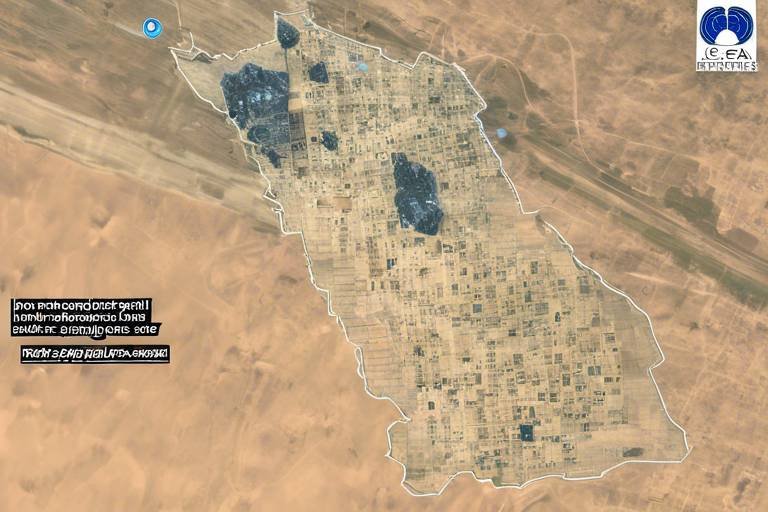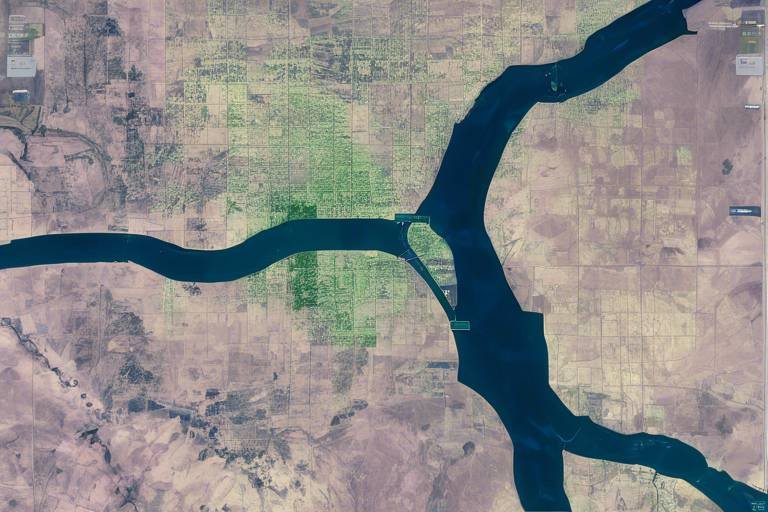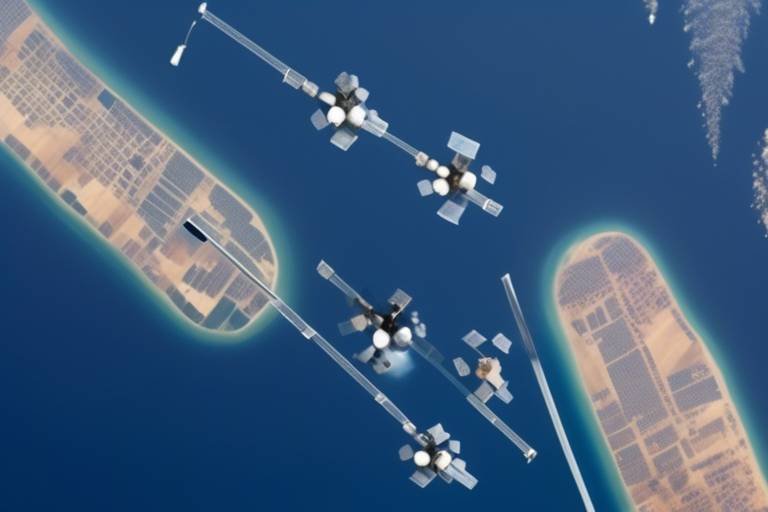Understanding the Legal Implications of Military Satellites
The realm of military satellites is not just a fascinating technological frontier; it is also a complex web of legal considerations that nations must navigate. As these satellites orbit our planet, they serve various purposes—from communication to reconnaissance—but they also pose significant questions about legality, sovereignty, and privacy. In a world where information is power, understanding the legal implications surrounding military satellites is crucial for ensuring global security and protecting individual rights. This article delves deep into the intricate legal frameworks that govern military satellite operations, examining international treaties, national policies, and the broader implications for society.
International treaties play a pivotal role in shaping the legal landscape for military satellites. The Outer Space Treaty, established in 1967, is perhaps the cornerstone of space law. It sets forth fundamental principles, such as the prohibition of placing nuclear weapons in space and the use of outer space for peaceful purposes. However, the treaty also leaves room for interpretation, leading to debates about military applications of satellite technology. Other significant agreements include the Registration Convention and the Liability Convention, which outline responsibilities for nations regarding the registration of space objects and liability for damages caused by those objects.
Each country has its own set of regulations governing military satellite operations, often influenced by international treaties. For instance, the United States has enacted laws like the National Aeronautics and Space Act, which governs the use of space, including military applications. In contrast, countries like China and Russia have developed their own frameworks that reflect their national interests and security concerns. These regulations often dictate how satellites can be deployed, the data they can collect, and how that data can be used. The intersection of these national policies with international law creates a legal tapestry that is as intricate as it is essential.
The United Nations (UN) plays an essential role in regulating space activities, including military satellite operations. Through various initiatives, the UN promotes responsible behavior among nations and encourages dialogue on the peaceful use of outer space. The Committee on the Peaceful Uses of Outer Space (COPUOS) is one such body that focuses on developing guidelines and best practices. By fostering international cooperation, the UN helps mitigate conflicts that may arise from military satellite operations, emphasizing the need for transparency and accountability.
As the number of satellites in orbit increases, so does the issue of space debris. Military satellites contribute to this growing concern, leading to legal responsibilities regarding debris mitigation and liability for damages. The Inter-Agency Space Debris Coordination Committee (IADC) has established guidelines for minimizing space debris, but compliance remains a challenge. Countries deploying military satellites must take proactive measures to ensure that their operations do not contribute to the debris problem, as failure to do so could lead to international disputes and legal repercussions.
Transparency in military satellite operations is vital for fostering international trust. Legal frameworks that promote accountability among nations using military satellites are crucial in this regard. For instance, nations are encouraged to share information about their satellite operations, including the purposes and capabilities of their satellites. This openness can help alleviate concerns about potential military aggression and enhance cooperative efforts in space exploration.
As military satellite operations expand, so do the legal challenges and disputes that may arise. Notable cases, such as the United States vs. China over satellite signal interference, highlight the complexities involved in international space law. Legal principles governing these disputes often draw from both international treaties and domestic laws, creating a multifaceted legal environment. Understanding these challenges is essential for nations as they navigate the evolving landscape of military satellite operations.
The surveillance capabilities of military satellites raise significant privacy concerns. As these satellites collect vast amounts of data, individuals and civil liberties advocates worry about the implications for personal privacy. Legal frameworks must address how satellite surveillance intersects with individual rights, ensuring that national security interests do not infringe upon civil liberties. This delicate balancing act is crucial in maintaining public trust while safeguarding national security.
Finding a balance between national security interests and privacy rights is no easy task. Various legal frameworks attempt to address this tension, often leading to heated debates. For instance, the Fourth Amendment in the United States protects against unreasonable searches and seizures, but how does it apply to surveillance conducted by military satellites? Courts are increasingly faced with the challenge of interpreting these laws in the context of modern technology, making it imperative for lawmakers to update regulations to reflect current realities.
Public awareness regarding military satellite operations is on the rise, fueled by advocacy efforts aimed at promoting transparency and protecting civil liberties. Organizations and activists are calling for clearer regulations that govern military surveillance and the use of satellite data. This growing movement emphasizes the importance of holding governments accountable for their actions in space, advocating for policies that prioritize both national security and individual rights.
- What are military satellites used for? Military satellites are primarily used for communication, reconnaissance, navigation, and surveillance.
- How do international treaties impact military satellite operations? International treaties provide a framework for the legal use of military satellites, establishing guidelines for responsible behavior among nations.
- What privacy concerns are associated with military satellites? Military satellites can engage in surveillance activities that may infringe on individual privacy rights, raising legal and ethical questions.
[International Treaties Governing Military Satellites]
The legal framework surrounding military satellites is primarily shaped by a series of international treaties that establish guidelines for their use in space. One of the most significant agreements in this realm is the Outer Space Treaty, which was adopted in 1967. This treaty lays the groundwork for the peaceful use of outer space, emphasizing that space should be accessible to all nations and should not be subject to national appropriation. It explicitly prohibits the placement of nuclear weapons in space and limits the use of celestial bodies for military purposes. In essence, the treaty aims to prevent a militarized space race and promotes cooperation among nations.
In addition to the Outer Space Treaty, there are other agreements that further define the legal landscape for military satellites. For instance, the Rescue Agreement and the Liability Convention outline responsibilities for nations in the event of accidents involving space objects. These treaties highlight a shared responsibility to assist astronauts in distress and to compensate for damages caused by space activities. This is crucial as military satellites are often equipped with advanced technology that can malfunction or collide with other objects in space, potentially leading to significant consequences.
Furthermore, the Registration Convention mandates that countries must register their space objects with the United Nations. This requirement enhances transparency and accountability, allowing nations to keep track of military satellites and their operations. However, the challenge arises in determining what constitutes a military satellite, as many satellites serve dual purposes—both civilian and military. This dual-use nature complicates the legal definitions and can lead to disputes over compliance with international law.
To provide a clearer understanding of these treaties, the following table outlines some key international treaties governing military satellites:
| Treaty Name | Year Adopted | Key Provisions |
|---|---|---|
| Outer Space Treaty | 1967 | Prohibits the placement of nuclear weapons in space; promotes peaceful use of outer space. |
| Rescue Agreement | 1968 | Outlines responsibilities for assisting astronauts in distress. |
| Liability Convention | 1972 | Establishes liability for damages caused by space objects. |
| Registration Convention | 1976 | Requires nations to register their space objects with the UN. |
As military technology evolves, the interpretation and enforcement of these treaties will be critical. The rise of private space companies and the increasing number of satellites in orbit add layers of complexity. How will existing treaties adapt to these changes? Will nations adhere to the principles set forth in these agreements as they pursue their military objectives? These questions remain at the forefront of discussions regarding the future of military satellites and their legal implications.
In conclusion, the international treaties governing military satellites are essential in maintaining a framework for responsible behavior in outer space. They not only foster cooperation among nations but also help mitigate the risks associated with military activities in space. As we continue to explore and utilize outer space, the importance of these legal agreements cannot be overstated. The balance between national security and international cooperation will be a defining issue in the years to come.
[National Regulations and Policies]
When it comes to military satellites, national regulations and policies play a pivotal role in shaping how these powerful tools are deployed and utilized. Each country has its own unique set of laws that govern the operation of military satellites, reflecting its national interests and security concerns. For instance, the United States has a robust framework that integrates both commercial and military satellite operations, ensuring that national security is prioritized while also fostering innovation in space technology.
Countries like Russia and China also have stringent regulations that dictate their military satellite operations, often emphasizing the need for secrecy and strategic advantage. These regulations can include everything from the licensing of satellite launches to the management of satellite data. The complexity of these regulations often leads to a patchwork of policies that can be difficult to navigate, especially for international collaborations.
One of the key aspects of national regulations is the balance they aim to strike between operational efficiency and legal compliance. For example, nations must ensure that their military satellites do not interfere with civilian satellite operations, which are governed by international treaties. This is where the interplay between national policies and international law becomes crucial. Countries must align their regulations with international norms while also addressing their unique security needs.
Let's take a closer look at some of the common elements found in national regulations regarding military satellites:
- Authorization and Licensing: Most countries require military satellites to be authorized and licensed by a governmental authority before they can be launched. This process often involves a thorough review of the satellite's purpose and potential risks.
- Data Management: Regulations often dictate how data collected by military satellites can be used, shared, and stored, ensuring that sensitive information is protected from unauthorized access.
- Environmental Considerations: Many countries have laws in place that address the environmental impact of satellite launches and operations, requiring assessments to minimize harm to the Earth's atmosphere and space environment.
Moreover, the legal landscape is constantly evolving. As technology advances, countries are updating their regulations to address new challenges such as cybersecurity threats and the increasing prevalence of space debris. This dynamic environment means that stakeholders in the military satellite sector must remain vigilant and adaptable.
In summary, national regulations and policies surrounding military satellites are essential for ensuring that these powerful tools are used responsibly and effectively. By navigating the complex web of laws and regulations, countries can enhance their security while also fostering international cooperation in space. The future of military satellite operations will undoubtedly depend on how well nations can balance their individual interests with the broader need for global stability and security.
Q: What are the main purposes of military satellites?
A: Military satellites serve various purposes, including reconnaissance, communication, navigation, and missile warning. They provide critical information that helps nations maintain security and respond to threats.
Q: How do national regulations affect international cooperation in space?
A: National regulations can either facilitate or hinder international cooperation. Countries with compatible regulations may find it easier to collaborate on satellite projects, while conflicting laws can create barriers.
Q: What are the consequences of violating national regulations regarding military satellites?
A: Violating national regulations can lead to severe penalties, including fines, revocation of licenses, and even criminal charges. Additionally, it can damage a country's reputation and hinder future collaborations.
[The Role of the United Nations]
The United Nations (UN) has established itself as a pivotal player in the realm of international space law, particularly concerning military satellites. As the world becomes increasingly reliant on satellite technology for both civilian and military purposes, the UN's role in regulating these activities cannot be overstated. Through various initiatives and treaties, the UN aims to foster a cooperative environment that encourages responsible behavior among nations utilizing military satellites.
One of the key frameworks established by the UN is the Outer Space Treaty, adopted in 1967. This treaty serves as the cornerstone of international space law, outlining the principles that govern the use of outer space, including the deployment of military satellites. According to the treaty, space shall be used for peaceful purposes, and military operations that threaten peace or security are strictly prohibited. This legal foundation is crucial for maintaining a balance between national interests and global security.
Moreover, the UN has created specialized agencies, such as the Office for Outer Space Affairs (UNOOSA), which work diligently to promote international cooperation in space exploration and the use of satellites. UNOOSA facilitates discussions among member states, helping to establish norms and guidelines that govern military satellite operations. Through workshops, conferences, and collaborative projects, the UN fosters an environment where nations can share their experiences and best practices, ultimately leading to more responsible satellite use.
However, the UN's efforts are not without challenges. With the rapid advancement of technology and the increasing number of satellites in orbit, there is a growing concern about issues like space debris and the militarization of space. In response, the UN has initiated discussions on space debris mitigation and has encouraged nations to adopt best practices to minimize the risks associated with satellite collisions. The UN's role in addressing these challenges is crucial for ensuring the long-term sustainability of outer space activities.
In addition to promoting responsible behavior, the UN also emphasizes the importance of transparency and accountability in military satellite operations. By advocating for open communication and sharing information among nations, the UN seeks to build trust and reduce the potential for conflicts arising from misunderstandings or misinterpretations of military activities in space. This transparency is vital in an era where the lines between military and civilian satellite operations are increasingly blurred.
Ultimately, the UN's role in regulating military satellites is not just about enforcing laws; it's about fostering a culture of cooperation and mutual respect among nations. As we look to the future, the UN's initiatives will be essential in navigating the complex legal landscape surrounding military satellites, ensuring that space remains a domain for peaceful exploration and collaboration.
- What is the Outer Space Treaty? The Outer Space Treaty is a key international agreement that establishes the principles for the peaceful use of outer space, including regulations on military activities.
- How does the UN regulate military satellites? The UN promotes international cooperation and establishes guidelines through agencies like UNOOSA to ensure responsible use of military satellites.
- What are the main challenges facing military satellite regulation? Challenges include space debris management, the militarization of space, and ensuring transparency among nations.
[Space Debris and Responsibility]
The cosmos is not just a vast expanse filled with twinkling stars and distant galaxies; it has become a bustling highway of satellites and debris. With the increasing number of military satellites launched into orbit, the issue of space debris has escalated into a pressing concern. But what exactly is space debris? In simple terms, it's the collection of defunct satellites, spent rocket stages, and fragments from collisions that orbit the Earth. As military operations expand beyond our planet, the legal responsibilities surrounding this debris become crucial.
International law, particularly the Outer Space Treaty of 1967, emphasizes that nations must avoid harmful interference with the activities of other states in outer space. This principle raises significant questions: Who is responsible for the debris created by military satellites? If a piece of debris collides with an operational satellite, who bears the cost of damages? These questions highlight the need for clear legal frameworks addressing the responsibilities of nations regarding space debris.
To tackle these issues, several treaties and guidelines have been established, such as the Inter-Agency Space Debris Coordination Committee (IADC) guidelines and the United Nations' Long-term Sustainability of Outer Space Activities initiative. These frameworks aim to promote best practices in debris mitigation and to ensure that nations take responsibility for their space activities. However, enforcement remains a challenge, as there is no overarching authority to impose penalties for violations.
Moreover, the concept of liability is particularly pertinent when discussing space debris. According to the Convention on International Liability for Damage Caused by Space Objects, a launching state is liable for damages caused by its space objects on the surface of the Earth and in outer space. This principle establishes a legal precedent that could be applied when military satellites contribute to the growing problem of space debris. However, the complexity arises when multiple nations are involved in a single satellite's operation or when debris originates from a collision between two satellites owned by different countries.
As military satellites continue to proliferate, the potential for collisions increases, leading to a vicious cycle of debris generation. The responsibility for mitigating this risk lies not only with the military organizations that operate these satellites but also with the international community as a whole. Nations must collaborate to develop robust frameworks that not only address the creation of space debris but also facilitate the cleanup of existing debris.
In conclusion, the issue of space debris is a double-edged sword; it highlights the incredible advancements in military satellite technology while simultaneously raising serious questions about responsibility and accountability. As we venture further into the cosmos, it is imperative that nations recognize their obligations to maintain a sustainable space environment. Without collective action and adherence to established legal frameworks, the future of space operations could be jeopardized, leading to a cluttered and hazardous environment for all.
- What is space debris? Space debris consists of non-functional satellites, spent rocket stages, and fragments resulting from collisions in orbit around the Earth.
- Who is responsible for space debris? Responsibility lies with the nations that launch satellites, as established by international treaties like the Outer Space Treaty.
- What are the consequences of space debris? Space debris poses risks to operational satellites, can cause collisions, and complicates future space missions.
- How can we mitigate space debris? Best practices include designing satellites for deorbiting, active debris removal efforts, and international cooperation on space traffic management.
[Transparency and Accountability]
In an era where military satellites play a pivotal role in national security, the need for transparency and accountability has never been more crucial. Military operations in space are often shrouded in secrecy, making it challenging for the public to understand the implications of these activities. This lack of transparency can lead to mistrust between nations and raise concerns about the potential for misuse of satellite technology.
One of the primary frameworks promoting transparency is the United Nations Office for Outer Space Affairs (UNOOSA), which encourages nations to share information regarding their satellite operations. Through initiatives like the Register of Objects Launched into Outer Space, countries are urged to provide details about their satellites, including their purpose and operational status. This registry not only fosters accountability but also helps in tracking space debris, a growing concern in the international community.
Furthermore, international treaties like the Outer Space Treaty of 1967 lay down fundamental principles that govern the use of outer space, including military satellites. These treaties emphasize the importance of peaceful purposes in space and encourage nations to avoid harmful interference with the activities of other states. However, the effectiveness of these treaties often hinges on the willingness of nations to adhere to their commitments, which brings us to the role of accountability.
Accountability mechanisms can take various forms. For instance, nations may be required to report their satellite activities to international bodies, which can then assess compliance with established norms. Additionally, bilateral and multilateral agreements can be established to ensure that countries are held responsible for their actions in space. Such agreements can include provisions for dispute resolution and liability for damages caused by military satellites, thereby enhancing the overall trust among nations.
Despite these frameworks, challenges remain. The rapid advancement of technology often outpaces the development of legal structures, leading to gaps in accountability. For example, the rise of dual-use technologies—those that can serve both civilian and military purposes—complicates the enforcement of transparency and accountability measures. As nations increasingly rely on sophisticated satellite systems for both defense and commercial applications, the lines blur, making it essential to revisit existing legal frameworks and adapt them to current realities.
In conclusion, while there are mechanisms in place to promote transparency and accountability in military satellite operations, continuous efforts are necessary to ensure these frameworks remain effective. By fostering open communication and establishing clear accountability measures, the international community can work towards a more secure and responsible use of outer space.
- What is the role of the United Nations in regulating military satellites?
The UN promotes transparency and accountability among nations through initiatives like UNOOSA and the Register of Objects Launched into Outer Space. - How do international treaties affect military satellite operations?
Treaties like the Outer Space Treaty establish principles for peaceful use and encourage nations to avoid harmful interference. - What are the challenges in ensuring accountability?
The rapid advancement of dual-use technologies and the gaps in existing legal frameworks pose significant challenges to accountability.
[Legal Challenges and Disputes]
The realm of military satellites is not just about advanced technology and strategic advantages; it also opens the door to a myriad of legal challenges and disputes. As nations deploy these high-tech assets into orbit, the potential for conflict—both diplomatic and legal—escalates. One of the most pressing issues is the interpretation of existing international treaties. For instance, while the Outer Space Treaty of 1967 lays down the fundamental principles for the use of outer space, its vague language can lead to differing interpretations among nations. This ambiguity often results in disputes over what constitutes acceptable military use of satellites.
Furthermore, the rise of commercial space activities complicates the legal landscape. Companies are now launching satellites for various purposes, including military applications, which raises questions about jurisdiction and accountability. Who is responsible if a commercial satellite, operated for military purposes, collides with another satellite? These scenarios highlight the urgent need for clear legal guidelines that can adapt to the rapidly evolving space environment.
Legal disputes may arise from various incidents, including satellite collisions, unauthorized surveillance, and the use of military satellites for purposes beyond their stated missions. For example, consider a situation where one country claims that another nation’s satellite is infringing on its airspace or conducting espionage. Such allegations can lead to heightened tensions and even military confrontations. Legal frameworks need to be robust enough to address these issues while also fostering cooperation among nations.
One notable case that illustrates these challenges is the dispute between the United States and China regarding satellite surveillance. The U.S. has accused China of using military satellites to monitor American military bases, while China counters that it is merely exercising its right to observe activities in space. This back-and-forth not only strains diplomatic relations but also raises critical questions about the legality of surveillance conducted by military satellites. In this context, international law must evolve to provide clear guidelines on acceptable practices in space.
To navigate these complex issues, some experts advocate for the establishment of a dedicated international body that focuses solely on space law and military satellite operations. Such a body could facilitate dialogue, mediate disputes, and create standardized regulations that all nations can agree upon. In the meantime, it is crucial for countries to engage in transparency and open communication to mitigate misunderstandings and foster a cooperative atmosphere in space.
In summary, as military satellites become increasingly integral to national security, the legal challenges and disputes surrounding their use will likely intensify. Nations must work collaboratively to address these issues, ensuring that space remains a domain of peace and cooperation rather than conflict.
- What international treaties govern military satellites?
The Outer Space Treaty is the primary international treaty that outlines the principles for the peaceful use of outer space, including military activities. - What are some common legal disputes involving military satellites?
Common disputes include satellite collisions, unauthorized surveillance, and allegations of espionage between nations. - How can nations resolve disputes related to military satellites?
Nations can resolve disputes through diplomatic channels, international arbitration, and by adhering to established treaties and agreements. - What role does the United Nations play in regulating military satellites?
The UN promotes responsible behavior among nations and provides a platform for dialogue and cooperation on space-related issues.
[Privacy Concerns and Surveillance]
In today's world, where technology advances at a breakneck pace, the use of military satellites for surveillance has become a hot-button issue. These high-tech tools are not just floating pieces of metal in the sky; they are powerful instruments that can monitor vast areas of the Earth, capturing images and data that can be used for various purposes. However, this capability raises significant privacy concerns for individuals and communities alike. Have you ever wondered how much of your daily life is visible to these satellites? The thought can be unsettling, and rightly so.
The legal implications of military satellite surveillance are complex. On one hand, nations argue that these satellites are essential for national security, enabling them to monitor threats and gather intelligence. On the other hand, the potential for abuse of this technology looms large. The question arises: how do we safeguard individual rights in the face of such pervasive surveillance? This dilemma is further complicated by the lack of clear international regulations governing the use of military satellites for surveillance purposes.
To illustrate the magnitude of the issue, consider the following table that outlines some of the primary concerns associated with military satellite surveillance:
| Concern | Description |
|---|---|
| Invasion of Privacy | Military satellites can capture images and data that may infringe on personal privacy. |
| Data Misuse | Information gathered can be misused for purposes other than national security. |
| Lack of Oversight | Insufficient regulations and oversight mechanisms can lead to unchecked surveillance. |
| Public Trust | Surveillance activities can erode public trust in government institutions. |
As military satellites continue to evolve, the legal frameworks surrounding their use must also adapt. Privacy advocates argue for stricter regulations to ensure that surveillance activities are conducted with transparency and accountability. Some suggest implementing oversight committees that can monitor satellite operations and ensure compliance with privacy laws. But will this be enough to protect individual rights? The answer remains unclear.
Moreover, the balance between national security and individual privacy is a delicate one. Governments must navigate this tightrope carefully, ensuring that while they protect their citizens from threats, they do not infringe upon the rights and freedoms that form the bedrock of democratic societies. The challenge lies in creating laws that are not only effective but also respect the fundamental rights of individuals.
As we delve deeper into the implications of military satellite surveillance, it becomes evident that public awareness and advocacy are crucial. Citizens must be informed about how these technologies impact their lives and what measures are being taken to protect their rights. Advocacy groups play a vital role in raising awareness and pushing for reforms that prioritize transparency and accountability in military operations.
In conclusion, while military satellites provide invaluable insights for national security, they also pose significant challenges regarding privacy and civil liberties. As technology continues to advance, so must our legal frameworks and public discourse surrounding these issues. The conversation is just beginning, and it is one that we must all engage in to ensure that our rights are protected in an increasingly surveilled world.
- What are military satellites used for? Military satellites are primarily used for surveillance, reconnaissance, and communication purposes.
- How do military satellites impact individual privacy? They can capture images and data that may infringe upon personal privacy without individuals' knowledge or consent.
- Are there laws regulating military satellite surveillance? Yes, but the legal frameworks vary by country and often lack comprehensive international regulations.
- What can individuals do to protect their privacy? Staying informed and advocating for stronger privacy protections can help individuals safeguard their rights.
[Balancing National Security and Privacy]
When we talk about military satellites, the conversation often veers into the intricate dance between national security and individual privacy. It’s a bit like walking a tightrope; one misstep can lead to serious consequences. On one hand, governments argue that these satellites are essential for monitoring potential threats and ensuring the safety of their citizens. On the other hand, there’s a growing concern about how far this surveillance goes and at what cost to personal freedoms.
The legal frameworks in place aim to strike a delicate balance. For instance, laws governing the use of military satellites often include provisions that require oversight and accountability. However, the interpretation of these laws can vary significantly from one nation to another. In some countries, there are stringent regulations that protect individual privacy rights, while in others, national security concerns may take precedence, leading to more invasive surveillance practices.
To illustrate this point, consider the following table that outlines how different countries approach the balance between national security and privacy in their military satellite operations:
| Country | National Security Focus | Privacy Protections |
|---|---|---|
| United States | High | Moderate |
| Germany | Moderate | High |
| China | Very High | Low |
| France | Moderate | Moderate |
This table highlights the varying degrees of emphasis placed on national security versus privacy. The United States, for example, maintains a high focus on national security but also has some privacy protections in place, although they are often criticized as being insufficient. In contrast, Germany prioritizes privacy protections, reflecting its historical context and commitment to civil liberties.
Moreover, the rise of technology has made this balancing act even more complex. With advancements in satellite imaging and data analysis, the potential for surveillance has increased exponentially. This brings us to a critical question: How do we ensure that the tools designed to protect us do not infringe upon our rights? This is where public discourse and advocacy become vital. Citizens need to engage with policymakers to advocate for transparent practices that respect privacy while still addressing national security needs.
In conclusion, achieving a balance between national security and privacy in military satellite operations is not just a legal challenge; it’s a societal one. As we navigate this complex landscape, ongoing dialogue and public awareness will be crucial in shaping policies that protect both our safety and our freedoms.
- What are military satellites used for? Military satellites are primarily used for surveillance, reconnaissance, and communication to support national security interests.
- How do countries regulate military satellite operations? Regulations vary by country, often influenced by international treaties and national security policies.
- What are the privacy implications of military satellite surveillance? Military satellite surveillance can infringe on individual privacy rights, raising concerns about data collection and government oversight.
- How can citizens advocate for privacy protections? Citizens can engage in public discourse, support advocacy groups, and communicate with policymakers to promote transparency and accountability.
[Public Awareness and Advocacy]
In recent years, the conversation around military satellites has shifted dramatically, pivoting towards a greater emphasis on public awareness and advocacy. As these technological marvels orbit our planet, often conducting surveillance and gathering intelligence, the need for transparency has never been more pressing. Citizens are becoming increasingly aware of the implications of military satellite operations—especially regarding their privacy rights and the ethical considerations surrounding surveillance.
Organizations and grassroots movements are rising to the challenge, advocating for clearer regulations and more stringent oversight of military satellite activities. These advocacy groups often employ a variety of strategies to raise awareness, including:
- Public Campaigns: Utilizing social media platforms to spread information and mobilize public opinion.
- Educational Workshops: Hosting events to inform the public about the legal and ethical implications of military satellites.
- Collaborations with Experts: Partnering with legal scholars and technologists to produce informative content and reports.
Moreover, the role of technology in advocacy cannot be understated. With the rise of digital tools, advocates can now reach a global audience, ensuring that the dialogue surrounding military satellites includes diverse perspectives. For instance, the use of interactive platforms allows citizens to visualize how military satellites operate and the potential impacts on their daily lives. This not only educates the public but also empowers them to engage in meaningful discussions with policymakers.
Another vital aspect of advocacy is the push for legislation that protects individual rights. Activists argue that military surveillance should be subject to strict legal frameworks that balance national security needs with the protection of civil liberties. In many cases, this involves lobbying for laws that require governmental transparency regarding satellite operations and surveillance activities. The goal is to create a legal environment where the public can hold their governments accountable.
As advocacy efforts gain momentum, they often lead to significant changes in policy. For example, recent legislative proposals in various countries have sought to establish oversight committees that review military satellite activities and assess their compliance with both national and international laws. Such initiatives are crucial in fostering a culture of accountability and trust between governments and their citizens.
Ultimately, the movement for public awareness and advocacy surrounding military satellites is about more than just surveillance; it's about ensuring that the technological advancements we embrace do not come at the expense of our fundamental rights. By fostering a well-informed public and encouraging active participation in the discussion, we can create a future where military satellite operations are conducted responsibly and ethically.
| Question | Answer |
|---|---|
| What are military satellites used for? | Military satellites are primarily used for surveillance, communication, navigation, and reconnaissance purposes. |
| How do military satellites impact privacy? | Military satellites can conduct surveillance that may infringe on individual privacy rights, raising ethical and legal concerns. |
| What can citizens do to advocate for transparency? | Citizens can participate in advocacy campaigns, attend educational workshops, and engage with policymakers to promote transparency and accountability. |
Frequently Asked Questions
- What are military satellites used for?
Military satellites play a crucial role in national security by providing vital data for communication, navigation, reconnaissance, and surveillance. They help military forces to gather intelligence, monitor enemy movements, and coordinate operations globally.
- Are there international laws governing military satellites?
Yes, international treaties such as the Outer Space Treaty establish guidelines for the use of military satellites. These treaties aim to promote peaceful uses of outer space and prevent the militarization of space, ensuring that satellite operations adhere to international law.
- How do national regulations affect military satellite operations?
Each country has its own set of regulations that govern the deployment and operation of military satellites. These national policies must align with international agreements while also addressing specific national security needs, leading to a complex legal landscape.
- What role does the United Nations play in regulating military satellites?
The United Nations facilitates discussions and initiatives aimed at promoting responsible behavior in space. It encourages cooperation among nations, aiming to ensure that military satellite operations are conducted transparently and in accordance with international norms.
- What are the legal responsibilities regarding space debris?
As the number of satellites increases, so does the issue of space debris. Countries are legally obligated to mitigate space debris and may be held liable for damages caused by their satellites, which raises significant concerns about accountability in space operations.
- How does military satellite surveillance affect privacy rights?
Military satellites often conduct surveillance that can infringe on individual privacy rights. The legal implications of such activities are complex, as they must balance national security interests with the protection of civil liberties.
- What efforts are being made to promote transparency in military satellite operations?
Advocacy groups and public awareness campaigns are increasingly pushing for greater transparency in military satellite operations. These efforts aim to hold governments accountable and ensure that civil liberties are protected in the face of potential surveillance abuses.
- What are some notable legal challenges involving military satellites?
Legal disputes related to military satellites often arise from issues such as surveillance overreach or space debris liability. These cases highlight the need for clear legal principles governing the use of military satellites in both international and domestic contexts.




